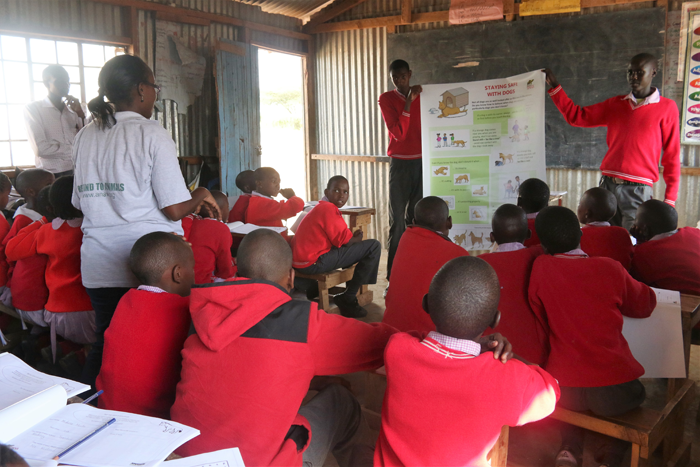 To work towards humane treatment of all animals in communities, attitude change is deemed as a critical pillar for the success of ANAW’s mission. Supported by findings from research information collected over time, ANAW has endeavored to promote a value based education program that inculcates young minds into compassionate individuals on the welfare of animals. This approach led to the establishment of the program called ‘Promoting Animal Welfare in Schools-PAWS’ run through the Animal Welfare Clubs in Kenya.
To work towards humane treatment of all animals in communities, attitude change is deemed as a critical pillar for the success of ANAW’s mission. Supported by findings from research information collected over time, ANAW has endeavored to promote a value based education program that inculcates young minds into compassionate individuals on the welfare of animals. This approach led to the establishment of the program called ‘Promoting Animal Welfare in Schools-PAWS’ run through the Animal Welfare Clubs in Kenya.
The animal welfare clubs were introduced in Kenya in 2013 through a partnership between the Society for the Protection of Animals Abroad (SPANA) - UK and Africa Network for Animal Welfare (ANAW). The program has since expanded to 42 schools spanning over 5 counties i.e. Machakos, Makueni, Kajiado, Nairobi and Kiambu Counties. So far a total of 5850 children have been impacted with knowledge on animals and animal welfare. This is expected to translate to attitude change in approximately 5850 households within the different counties, ultimately resulting to humane treatment of animals in these communities.
The program entails recruiting primary schools into the animal welfare clubs targeting 50 children from Grades 4-7 (mostly children aged between ages 7-13). In these clubs, basic principles on animal welfare are taught to the pupils for a one-year period. It employs an informal teaching methodology through such activities as discussions, games and puzzles which encourage critical thinking, close observation, problem solving and empathy development. Such children are then able to make decisions on their own regarding negative perceptions and myths about animals from an informed perspective.
PAWS is backed by the fundamentals of humane education. Animal welfare is one of the components of Humane Education. Humane Education is a form of education that encourages the understanding for the need of empathy, compassion and respect towards people, animals and the environment and understanding the interrelationship among the three. It is impossible to separate the three hence the need for harmony.
Unintentional cruelty is often passed from one generation to another and this makes humane education vital in our society. A child growing up in a home where animals are ill-treated will likely treat animals ill in future because he or she does not know otherwise. Teaching animal welfare education in schools is one of the best interventions we can offer.
The one-year curriculum used in Animal Welfare Clubs intends to equip children with basic knowledge in animal welfare such as the five welfare needs commonly known as the Five Animal Freedoms.